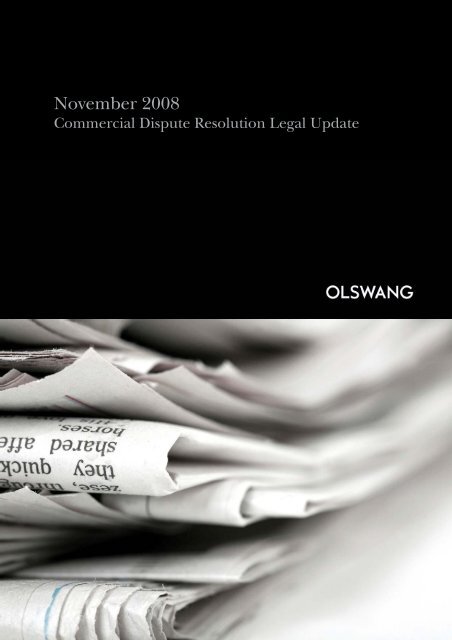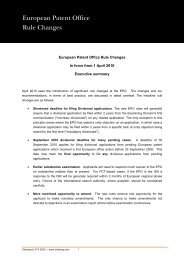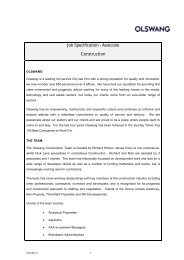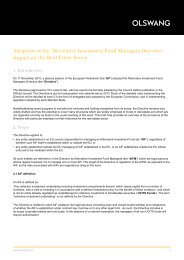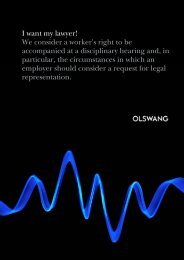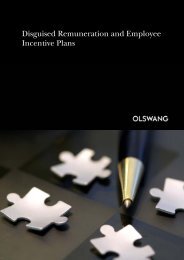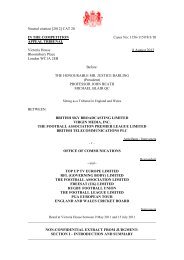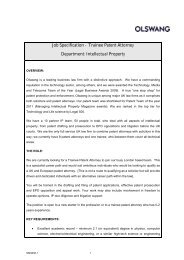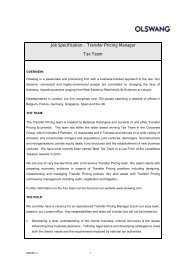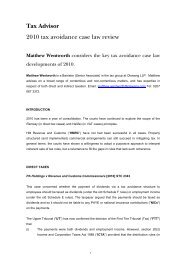November 2008 - Olswang
November 2008 - Olswang
November 2008 - Olswang
Create successful ePaper yourself
Turn your PDF publications into a flip-book with our unique Google optimized e-Paper software.
•<br />
<strong>Olswang</strong> © <strong>2008</strong> | www.olswang.com<br />
<strong>November</strong> <strong>2008</strong><br />
Commercial Dispute Resolution Legal Update
Recent legal<br />
developments<br />
Automotive Latch Systems v Honeywell: obligations of reasonable<br />
endeavours and reasonable time<br />
The recent decision of the Commercial Court in Automotive Latch Systems Ltd v Honeywell<br />
International Inc [<strong>2008</strong>] EWHC 2171 (Comm) adds to the law on obligations of reasonable endeavours<br />
and reasonable time.<br />
The factual background was that the parties were in dispute over a joint collaboration agreement for the<br />
development and manufacture of a car door latch. The managing director of the claimant, Automotive<br />
Latch Systems (ALS), had invented a new kind of car door latch intended to fit into any car door - the<br />
Universal Latch System (ULS). The defendant, Honeywell, was a technology and manufacturing company<br />
with experience in the automotive industry, but with no specific prior experience or expertise in car door<br />
latches. The parties entered into a joint collaboration agreement for the development and manufacture of<br />
the ULS by Honeywell.<br />
A number of problems and delays arose in the design and manufacture of the ULS. Eventually, ALS<br />
served a notice to terminate the joint collaboration agreement on the ground that Honeywell had committed<br />
several breaches of its obligation under Article 4.5. Under that provision Honeywell warranted that it would<br />
take "any and all reasonable actions without unreasonable delay to manufacture the latch". Both parties<br />
recognised that as with other "reasonable endeavours" obligations, the court was to apply objective criteria<br />
in determining the standard of performance required. However, the parties differed as to whether there<br />
was also a subjective element to this analysis, by reference to the precise experience of Honeywell.<br />
ALS contended that the provision imposed "a clear and all-encompassing obligation" on Honeywell to<br />
manufacture the latch, without any reference to Honeywell's lack of experience in the specific area of<br />
expertise. Honeywell argued in response that the standard required was that of the skill and care of an<br />
automotive component supplier with no specialisation or experience in car door latches. The judge<br />
agreed, taking into account the fact that Honeywell had made clear to ALS in advance of the contract being<br />
made the fact that Honeywell did not have specialist experience in manufacturing car latches. He noted<br />
that if ALS had wanted to impose the standard of an experienced latch manufacturer, it would have had to<br />
insist on an express term.<br />
The next question was that of what was required of Honeywell under Article 4.5 in terms of performance<br />
within a reasonable time (that being the implied obligation in the absence of the contract specifying any<br />
fixed date for performance). The judge started this analysis by applying the conclusion of the Court of<br />
Appeal in Peregrine Systems Limited v Steria Limited [2005] EWCA Civ 239 that determining what is a<br />
reasonable time is not confined to an assessment of what the parties contemplated or ought to have<br />
foreseen at the time of the contract being made. Instead, the Court of Appeal held that it involves a broad<br />
consideration, with the benefit of hindsight, at the time when one party contends that the other is in breach,<br />
<strong>Olswang</strong> © <strong>2008</strong> | www.olswang.com
of all the circumstances which are by then known to have happened, including the causes of any delay<br />
which has occurred in the meantime 1 .<br />
In ALS v Honeywell, Flaux J took the Court of Appeal's conclusion a stage further and held that the<br />
consideration of the reasonableness of the time taken would include consideration of matters which antedated<br />
the parties entering into the contract. This meant that it was necessary to consider whether ALS had<br />
misrepresented to Honeywell the stage which the design of the ULS had reached by the time when the<br />
contract was made.<br />
Reasonable endeavours obligations are often agreed in commercial contracts as a compromise position<br />
where a strict obligation involves too exacting a standard for a supplier. Similarly, obligations of<br />
reasonable time will often arise by implication, particularly in professional services contracts, where the<br />
complexity of a task may be too uncertain for a supplier to be willing to commit to a fixed date. Both the<br />
reasonable endeavours and the reasonable time aspects of the ALS v Honeywell decision illustrate the<br />
true breadth of such provisions, extending both to the circumstances made known between the parties in<br />
advance of the contract and to events which occur during the course of performance.<br />
1<br />
<strong>Olswang</strong> acted successfully for Peregrine Systems Limited at both first instance and on appeal.<br />
<strong>Olswang</strong> © <strong>2008</strong> | www.olswang.com
Unilateral mistake: the party's error must be as to the terms of the<br />
contract<br />
The recent decision of Aikens J in Statoil ASA v Louis Dreyfus Energy Services LP [<strong>2008</strong>] EWHC 2257<br />
(Comm) makes clear that a party can only avoid a contract on the ground of a unilateral mistake, which<br />
mistake is known to the other party, where that mistake is as to the terms of the contract. Where one party<br />
has made a mistake as to a fact or state of affairs which forms the basis upon which the terms of the<br />
contract were agreed, but that assumption does not become a part of the contract, the contract is binding<br />
even if the other party knew of the mistake and decided to keep quiet about it.<br />
In Statoil v Louis Dreyfus, the claimant entered into a contract with the defendant for sale by the claimant<br />
of a cargo of liquid propane gas. The contract included delivery of the cargo to a port in Mexico and<br />
provided for demurrage, i.e. liquidated damages for delays if the cargo was not discharged within the<br />
stipulated timeframe, at USD 40,000 per day.<br />
Discharge of the cargo was completed late and the claimant submitted a demurrage claim to the<br />
defendant. The defendant disputed the amount due and the parties subsequently agreed a sum by way of<br />
settlement. The settlement sum was agreed on the basis of the claimant's original demurrage calculation.<br />
However, that calculation was erroneous as the claimant had based the calculation on the wrong date for<br />
the completion of the discharge. The defendant admitted at trial that it had known that the claimant had<br />
made a mistake in the calculation but the defendant had decided to keep quiet about it.<br />
The claimant subsequently brought a claim for the balance of demurrage due to it under the contract for<br />
sale and argued that the settlement reached with the defendant was not binding because: (1) the<br />
settlement agreement was void for mistake at common law; or (2) the settlement agreement was voidable<br />
in equity and the court should declare the contract rescinded.<br />
Aikens J reiterated the general rule at common law that if one party had made a mistake as to the terms of<br />
the contract and that mistake was known to the other party, the contract was not binding because there<br />
was no true consensus between the parties and therefore it could not truly be said that there was a<br />
contract. However, it was well established law that if one party had made a mistake about a fact on which<br />
he based his decision to enter into the contract, but that fact did not form part of the contract itself, then,<br />
even if the other party knew that the first party was mistaken as to this fact, the contract would be binding.<br />
It was Aikens J's conclusion that, even though the claimant's calculation of the settlement sum had been<br />
based on the date for the completion of the discharge, that date was not a term of the settlement<br />
agreement itself. Consequently, the settlement agreement was not void for mistake at common law.<br />
Aikens J distinguished the present case from instances 2 where there is a unilateral mistake as to the price<br />
itself, i.e. where (due to, for example, an administrative error) the price stated in the contract is incorrect,<br />
and the other party knows that a mistake has been made and "snaps up the offer". As such cases<br />
involved a unilateral mistake as to a term of the contract, the contract would be void at common law.<br />
2<br />
For instance, the decision of the Singapore Court of Appeal in Chwee Kin Keong and others v Digilandmall.com Pte Ltd [2005] 1<br />
SLR 502, which was cited to him.<br />
<strong>Olswang</strong> © <strong>2008</strong> | www.olswang.com
Further, disagreeing with an earlier judgment by Andrew Smith J in Huyton SA v Distribuidora Internacional<br />
De Productos Agricolas SA de CV [2003] 2 Lloyd's Rep 780, Aikens J went on to hold that there was no<br />
equitable jurisdiction to grant rescission of a contract where one party had made a unilateral mistake as to<br />
a fact or state of affairs which formed the basis upon which the terms of the contract were agreed, and that<br />
mistake was known to the other party as being the basis for concluding the contract, but that assumption<br />
did not become a part of the contract.<br />
Aikens J reviewed the cases on which Andrew Smith J had based his decision and disagreed because<br />
each of those cases had been an instance not of unilateral but of common mistake, i.e. where both parties<br />
make a fundamental assumption of a state of affairs and the mistake renders performance of the essence<br />
of the obligation impossible. Aikens J commented in particular on the Court of Appeal's decision in The<br />
Great Peace 3 that there was no such equitable jurisdiction to grant rescission of a contract on the ground<br />
of common mistake where the contract was valid and enforceable at common law. Given that was the<br />
case, there was no logical rationale for an equitable jurisdiction in the case of unilateral mistake, at least<br />
where there had been no misrepresentation by the party not in error.<br />
In any event, even if there had been such a jurisdiction, on the facts of the case it would not have been just<br />
and equitable to grant rescission as the mistake was entirely the result of carelessness by the claimant.<br />
This case may come as a surprise to many people, who might consider it against instinct that the<br />
defendant, being aware of the claimant's mistaken assumption in the calculation of the settlement sum,<br />
was found to be entitled to keep quiet about the mistake and benefit from it (although in the event Aikens J<br />
held that, on the facts, agreement for a greater sum had been reached in a subsequent telephone<br />
conversation between the parties).<br />
It serves to reinforce the need for parties to take great care when calculating the monies due under a<br />
settlement agreement, or indeed any other contract. Where possible, parties may want to consider<br />
expressly stating the basis for such a calculation in the agreement itself to avoid being tied to<br />
administrative errors in the calculation.<br />
3<br />
Great Peace Shipping Ltd v Tsavliris Salvage (International) Limited [2003] QB 679.<br />
<strong>Olswang</strong> © <strong>2008</strong> | www.olswang.com
Restitutionary awards in antitrust cases? No (at least not yet).<br />
On 14 October <strong>2008</strong> the Court of Appeal handed down judgment in Devenish Nutrition Ltd v Sanofi-<br />
Aventis SA (France) and others [<strong>2008</strong>] EWCA Civ 1086, in which the appellant was seeking to establish<br />
the principle that in an action for breach of statutory duty the court could, in appropriate circumstances,<br />
make a restitutionary award (i.e. award a sum of money calculated by reference to the gain the wrongdoer<br />
has made) in place of compensatory damages (i.e. an award which compensates the innocent party for the<br />
damage he has suffered).<br />
In <strong>November</strong> 2001, the European Commission fined a group of vitamin manufacturers more than €855<br />
million (subsequently reduced to approximately €700 million on appeal) after finding them to be in breach<br />
of Article 81 of the EC Treaty, a provision that prohibits agreements and concerted practices which<br />
prevent, restrict or distort competition. The companies had participated in a number of cartels that had,<br />
over many years in the 1990s, engaged in price-fixing and market-sharing arrangements in relation to the<br />
supply of various vitamin products.<br />
The Devenish litigation was issued in 2005 by a number of companies seeking to claim compensation for<br />
damage suffered as a result of the unlawful cartels. The claimants in these proceedings had all been<br />
purchasers of products either directly or indirectly (in the form of animal foodstuffs containing the vitamins)<br />
from the vitamin manufacturers during the cartel's existence.<br />
The claimants alleged that the defendants' wrongful actions, namely the cartel activities, had been<br />
performed in the knowledge of and in wilful disregard of the claimants' rights, in a calculating fashion<br />
and/or with the expectation of profiting from them by amounts exceeding the amounts that would be<br />
payable by way of damages to the claimants. The claimants were seeking a restitutionary award equal to<br />
the amount by which they had been overcharged for vitamin products as a result of the price-fixing.<br />
A preliminary issue before the High Court was whether the claimants were entitled (in addition, or as an<br />
alternative to compensatory damages) to a restitutionary award for unjust enrichment (being an award of<br />
money assessed by reference to the defendants' gain rather than by reference to the claimants' loss).<br />
The first instance judge (see Devenish Nutrition Ltd and others v Sanofi-Aventis SA and others [2007]<br />
EWHC 2394) considered the decision of the House of Lords in Attorney General v Blake ("Blake") [2001] 1<br />
AC 268. However, he concluded that by reason of two precedent decisions of the Court of Appeal, Stokeon-Trent<br />
City Council v W & J Wass Ltd ("Wass") [1988] 1 WLR 1406 and Halifax Building Society v<br />
Thomas [1996] Ch 217, it was not yet the law that a restitutionary award was available in all tort cases, and<br />
he was prevented from granting a restitutionary award for a non-proprietary tort (and consequently a<br />
restitutionary award was not an available remedy in an antitrust case). He also held that as a result of<br />
there being multiple claimants in the Devenish claim who represented only part of the injured class, this<br />
prevented a restitutionary award due to the problem of allocating any award between the<br />
claimants/members of the injured class.<br />
Following this ruling, one of the claimants, Devenish Nutrition Ltd ("Devenish"), applied for and was<br />
granted permission to appeal to the Court of Appeal. As Devenish had been unable to establish that it had<br />
suffered a financial loss entitling it to compensatory damages - in part because of incomplete<br />
documentation and also as it appeared that Devenish might have passed on all or most of the defendants'<br />
<strong>Olswang</strong> © <strong>2008</strong> | www.olswang.com
overcharge to its customers - it sought a share of the cartels' illegally gained profits by appealing the High<br />
Court's finding in relation to the availability of a restitutionary award.<br />
The Court of Appeal dismissed the appeal by Devenish, although the three judges did not take a unified<br />
approach.<br />
Lady Justice Arden concluded that the decision of the House of Lords in Blake established that a<br />
retitutionary award is available for breach of contract and that the making of a restitutionary award does not<br />
depend on a proprietary right being infringed or the award being compensatory for loss, but on whether<br />
damages alone would be a sufficient remedy in the eyes of the law for the wrong that has occurred. She<br />
did not consider this to be inconsistent with such a remedy being available in the case of a non-proprietary<br />
tort. However, she felt unable to develop this line of thinking because she considered that:<br />
• the Court of Appeal was bound by the decision in Wass which she took to have held that damages<br />
assessed on a purely compensatory basis are the only damages available for torts other than<br />
proprietary torts; and<br />
• Blake had not "necessarily overruled" Wass.<br />
Lord Justice Tuckey agreed with Lady Justice Arden and stated "I do not think it can be said that Wass,<br />
which was not cited in Blake, has necessarily been overruled by it. It can stand with Blake".<br />
Lord Justice Longmore took a different approach in that he did not consider that Wass was authority for the<br />
proposition that account of profits awards were necessarily confined to tortious claims for breach of<br />
proprietary rights. However, he dismissed the appeal on the basis that an account of profits outside the<br />
established categories was to be made only in exceptional cases and cartel cases were not sufficiently<br />
exceptional.<br />
Arden and Tuckey LLJ also indicated that even if they had not been bound by Wass, a restitutionary<br />
remedy would only be available in "exceptional circumstances", and that this condition was not satisfied in<br />
the present case given that compensatory damages would constitute an adequate remedy for Devenish.<br />
This was so even in circumstances where there were evidential difficulties in making out the compensatory<br />
damages claim. It was also noted that such a restitutionary award would confer an unfair windfall on<br />
Devenish to the extent that it had passed on any overcharge to indirect purchasers.<br />
Whilst all three judges took the view that Blake supported the possibility of restitutionary damages on a<br />
broader basis than breach of contract, they disagreed as to the meaning and significance of Wass. The<br />
breadth of application of restitutionary remedies and whether Wass can stand alongside Blake are issues<br />
that have some life in them yet.<br />
What Devenish establishes is that restitutionary damages are not available in cartel damages claims and<br />
that liability in such cases will be limited to compensatory damages linked to a claimant's provable losses.<br />
As a consequence the amounts recoverable by claimants in such situations could be significantly lower<br />
than they might otherwise have been.<br />
This outcome brings into question the effectiveness of proposals put forward by the Civil Justice Council<br />
and the Office of Fair Trading earlier this year to encourage so-called private enforcement of competition<br />
law, which critics suggested would lead to a sudden increase of costly US-style class action lawsuits. In<br />
deciding that restitutionary awards are not, as a matter of policy, necessary in such cases for justice to be<br />
<strong>Olswang</strong> © <strong>2008</strong> | www.olswang.com
done, the Court of Appeal has made the pursuit of private competition damages a far less commercially<br />
viable and attractive prospect.<br />
Although Devenish was refused permission by the Court of Appeal to appeal to the House of Lords, it<br />
remains to be seen whether it will petition the House of Lords for leave to continue arguing this<br />
fundamental issue for the law of tort.<br />
<strong>Olswang</strong> © <strong>2008</strong> | www.olswang.com
Section 994 of the Companies Act 2006 – valuing the minority<br />
interest<br />
Any member of a company (whether or not a minority, although in practice a majority will not need to take<br />
this kind of legal action as they have control of the company) may apply to the court by petition for an order<br />
on the grounds that: (1) the affairs of the company are being, or have been, conducted in a manner which<br />
is unfairly prejudicial to the interests of members generally or of some part of its members (including at<br />
least that shareholder); or (2) any actual or proposed act or omission of the company is or would be so<br />
prejudicial.<br />
In the case of Re McCarthy Surfacing Ltd [<strong>2008</strong>] EWHC 2279 (Ch), a petition of this nature was brought<br />
under section 459 of the Companies Act 1985 ("the 1985 Act") 4 in respect of McCarthy Surfacing Ltd (the<br />
"Company"). The petition was brought by Mr Hoare and Mr Hecquet, the registered shareholders of 20%<br />
each of the shares in the Company, along with Mr Marsden, who claimed beneficial ownership of those<br />
shares (the "Petitioners"). The petition was against the three other members of the Company, the<br />
McCarthy brothers, each of whom owned 20% of shares in the Company, along with the Company itself<br />
(the "Respondents").<br />
In 1994 (at which time Mr Hoare, Mr Hecquet and the McCarthy brothers were all working directors and<br />
equal shareholders in the Company) Mr Hoare and Mr Hecquet launched a petition under section 459 of<br />
the 1985 Act, making serious allegations of misconduct against the Respondents. The petition was heard<br />
in 1996 and was unsuccessful and described by the judge as an abuse of process. Consequently, Mr<br />
Hoare and Mr Hecquet resigned as directors but claimed that they had transferred their shares to Mr<br />
Marsden.<br />
In May 2005, the Petitioners submitted a second petition claiming that since 1996 the Company had been<br />
run in a manner that was unfairly prejudicial to their interests as shareholders of the Company (albeit that<br />
the Company had refused to register Mr Marsden as a shareholder).<br />
The Petitioners argued that the following actions of the Company constituted acts of unfair prejudice:<br />
1. Entering into a set of "bonus agreements" whereby the whole of the net profits of a lucrative<br />
contract with Thames Water (which from 1998 comprised substantially all of the Company's<br />
business) were to be divided amongst the directors (and one non-director), to the exclusion of the<br />
shareholders of the Company (including the Petitioners).<br />
2. Failing to declare any dividends since 1996.<br />
3. Making a number of improper payments to or for the benefit of Tom McCarthy (one of the<br />
McCarthy brothers and managing director of the Company), including payments: (i) for the lease of<br />
some rooms in a property that was owned by Tom McCarthy and his partner; (ii) for a licence<br />
agreement made with a company called Digimage Ltd which was owned by Tom McCarthy and his<br />
partner; and (iii) to The Englishman Ltd, a consultancy service owned by Tom McCarthy.<br />
4<br />
Section 459 has now been replaced by section 994 of the Companies Act 2006 ("the 2006 Act"). The new provision remains in<br />
essence the same and therefore the principles that emerge from this case are likely to be applicable to section 994 of the 2006 Act.<br />
<strong>Olswang</strong> © <strong>2008</strong> | www.olswang.com
In reaching his decision, Michael Furness QC (sitting as a deputy judge) noted with disapproval that there<br />
were almost no minutes of directors' meetings for the Company and formed the view that Tom McCarthy<br />
was not a reliable witness.<br />
The judge went on to hold that in relation to the three elements of the claim identified above:<br />
1. While there was a legitimate commercial reason for giving non-shareholder directors and<br />
executives a share of the profits from the Thames Water contract as an incentive, the making of<br />
the "bonus agreements" (amounting to 81% in total - 45% for Tom McCarthy and 18% for each of<br />
his brothers) in favour of the McCarthy brothers (who were shareholders and already entitled to a<br />
share of the profits of the Company) constituted unfair prejudice. It was a device deliberately<br />
designed to ensure that none of the profits of the Thames Water contract would be available to the<br />
Petitioners. He also held that it was a breach of the directors' fiduciary duties to allow, without<br />
scrutiny, Tom McCarthy to award himself a substantial share of the profits of the Thames Water<br />
deal. It was also a breach of duty by Tom McCarthy to award himself such a share of the profits<br />
taking into account the "impossible conflict of duty and interest in which he had placed himself".<br />
Accordingly, the bonus agreements were judged to be unenforceable against the Company (as<br />
they related to the McCarthy brothers).<br />
2. This was not a case where the board had bona fide decided not to declare dividends in the best<br />
interests of the Company, but where the board had consistently failed to consider whether or not to<br />
declare dividends, and "that must be a breach of duty".<br />
3. "There was a complete lack on the part of the board of any critical scrutiny" of the terms of the<br />
transactions with Tom McCarthy. In assessing whether the transactions constituted unfair<br />
prejudice the judge was faced with the difficulty that there was no evidence of what a fair price for<br />
those transactions would have been. He concluded that in respect of (i) the lease (save in respect<br />
of one issue) and (iii) the consultancy, it was unclear whether different arrangements would have<br />
been agreed "had the board paid proper attention to its responsibilities". However, in relation to (ii)<br />
the licence arrangements, he concluded that "the board's failure to have regard to the Company's<br />
interests when agreeing to the licence agreements has probably cost the Company money, and<br />
therefore constitutes unfair prejudice".<br />
The judge accepted that the appropriate remedy was an order that the Petitioners' shares in the Company<br />
be bought and he then went on to consider the basis on which their interest should be valued. The<br />
Petitioners sought a valuation without a discount being applied to reflect that they held a minority interest in<br />
the Company. The Respondents claimed that a discount should be applied.<br />
In considering the authorities, the judge identified that an undiscounted approach was appropriate where<br />
the company was a "quasi-partnership", but a discounted approach would apply where the relevant<br />
shareholder bought his shares as an investor. In analysing the relationship between Mr Hecquet, Mr<br />
Hoare and the McCarthy brothers the judge concluded that there was originally a quasi-partnership (not<br />
least because the five shareholders had equal shareholdings, worked for the company and profits were<br />
distributed by unanimous agreement of the shareholders). However, by their wrongful acts in relation to<br />
the original "abuse of process" section 459 petition following which they departed from the Company, Mr<br />
Hecquet and Mr Hoare had destroyed the quasi-partnership.<br />
<strong>Olswang</strong> © <strong>2008</strong> | www.olswang.com
Accordingly, the judge held that the shareholdings to be bought out should be valued as an investment, i.e.<br />
with a discount. However, the judge also held that, in calculating this value, it should be taken into account<br />
that Mr Hecquet and Mr Hoare had lost the chance to receive (undiscounted) dividends from the Company<br />
as a result of the board's failure to give proper consideration as to whether dividends should be declared.<br />
Re McCarthy Surfacing Ltd identifies examples of the kinds of practices that constitute unfair prejudice.<br />
The judge's finding is not surprising in that the board had simply permitted Tom McCarthy to do as he<br />
wished and certain actions had been deliberately intended to prejudice the shareholders. Had there been<br />
evidence before the judge as to what a fair price for the lease and consultancy transactions with Tom<br />
McCarthy would have been, it is likely that unfair prejudice would have been found in respect of these<br />
transactions - it is clear from the judgment that the judge took a dim view of Tom McCarthy and concluded<br />
that in some respects his evidence was a "deliberate fabrication".<br />
What is of particular interest in this case is the remedy awarded, including the distinction made between a<br />
quasi-partnership and a share investment, and how the judge was willing to "adjust" the standard valuation<br />
to reflect the fact that the unfairly prejudicial conduct included a lost opportunity to receive dividends.<br />
<strong>Olswang</strong> © <strong>2008</strong> | www.olswang.com
<strong>Olswang</strong>'s<br />
Commercial Dispute<br />
Resolution Group<br />
The effective resolution and management of disputes is an essential part of corporate risk management<br />
and strategy. Our Commercial Dispute Resolution Group offers an expert, commercial and focused range<br />
of dispute resolution services which enables our clients to do just that.<br />
Our network of established relationships throughout Europe and the rest of the world means we are able to<br />
offer an effective national and global litigation service. Our Commercial Dispute Resolution Group advises<br />
on the full range of commercial disputes, in sectors including technology, media, telecoms, sport, life<br />
sciences, energy and financial services.<br />
The Group is particularly well-known for its work in:<br />
• Domestic commercial litigation;<br />
• Substantial multi-jurisdictional litigation;<br />
• Judicial review;<br />
• Regulatory and governmental issues and disputes;<br />
• International arbitration;<br />
• Mediation and other forms of alternative dispute resolution; and<br />
• Conducting investigations and independent enquiries.<br />
We recognise that litigation is often a last resort for our clients and are aware of the commercial pressures<br />
that our clients face. In advising our clients as to their best course of action when faced with a dispute, we<br />
will have regard to those pressures and factors.<br />
Our commercial litigators have significant experience in all forms of alternative dispute resolution, and a<br />
number of our partners are trained, and practise, as mediators.<br />
If a dispute does result in formal litigation proceedings, our experienced Commercial Dispute Resolution<br />
Group can draw on its considerable experience in litigating complex commercial disputes in many major<br />
courts and tribunals, both in the UK and overseas, to provide practical, commercial, advice and assistance<br />
as the litigation progresses.<br />
<strong>Olswang</strong> © <strong>2008</strong> | www.olswang.com
For further information please contact<br />
Jeremy Mash<br />
Steven Corney<br />
Partner<br />
Partner<br />
+44 (0) 20 7067 3270 +44 (0) 20 7067 3509<br />
jeremy.mash@olswang.com<br />
steven.corney@olswang.com<br />
London<br />
90 High Holborn<br />
London WC1V 6XX<br />
T +44 (0) 20 7067 3000<br />
F +44 (0) 20 7067 3999<br />
Thames Valley<br />
Apex Plaza, Forbury Road<br />
Reading RG1 1AX<br />
T +44 (0) 20 7067 3000<br />
F +44 (0) 20 7071 7499<br />
Berlin<br />
Potsdamer Platz 1<br />
D-10785 Berlin<br />
T +49 (0) 30 700171-100<br />
F +49 (0) 30 700171-900<br />
Brussels<br />
Avenue Louise 326 bte 26<br />
Louizalaan 326 bus 26<br />
B-1050 Bruxelles/Brussel<br />
T +32 2 647 4772<br />
F +32 2 644 2165<br />
3171128-1


